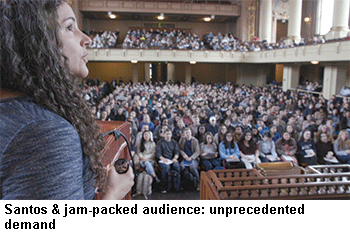 WHEN LAURIE SANTOS DESIGNED A NEW University course that would aim to show students how to be happy, she thought it might generate some interest. But she never expected it would become the most popular class in Yale University’s 316-year history. About 1,150 students — almost a quarter of undergraduates — at the Ivy League institution have now signed up for the Psychology and the Good Life course, which, because of unprecedented demand, is taught in the Woolsey Hall concert hall.
WHEN LAURIE SANTOS DESIGNED A NEW University course that would aim to show students how to be happy, she thought it might generate some interest. But she never expected it would become the most popular class in Yale University’s 316-year history. About 1,150 students — almost a quarter of undergraduates — at the Ivy League institution have now signed up for the Psychology and the Good Life course, which, because of unprecedented demand, is taught in the Woolsey Hall concert hall.
As well as teaching students about the ‘science of positive psychology’ and ‘science of behaviour change’, the class includes a non-graded component that encourages participants to “rewire your habits”, says Prof. Santos, a psychology professor and residential college head at Yale, who designed the course.
She was inspired to launch the course in part because of what she had observed about undergraduates’ well-being. “I think that students are really more anxious and stressed than folks often realise,” she says. Beyond that, though, “We’re in a moment in the field of psychology where the field really has a lot to say about what you can do to be happier and less stressed out and live a better life”.
The theme of the course satisfies a natural human question of how to be happy, but Santos believes today’s fast-paced world, which creates high levels of uncertainty, is also a factor in its popularity. “I do think we’re at a moment where folks are worried about these kinds of issues,” she says. “As a culture, we’ve become more stressed out, and as a culture we’ve moved away from some of the things that make us really happy and make us really feel like living a self-fulfilled life. Therefore, it makes sense that people want to come up with practices to live better.” In response to the huge success of the class and demand from the wider community, a shorter, free version of the course will be made available to the general public through the Coursera platform, and Yale is developing an app for the practical component.
Prof. Santos says she hopes the course will ameliorate the culture of anxiety prevalent among on-campus students. The undergraduates she teaches are “obviously really lucky to be privileged enough to come to a place like Yale. But there is the question of at what cost,” she says. “I designed the course in part to teach them what really matters, what they can do to live happier, less stressed lives. I hope they’ll put those practices into effect for themselves.”